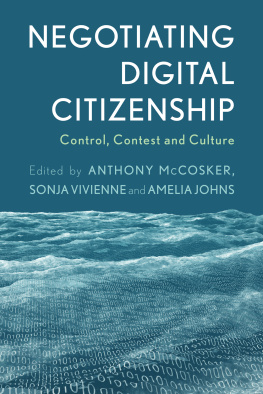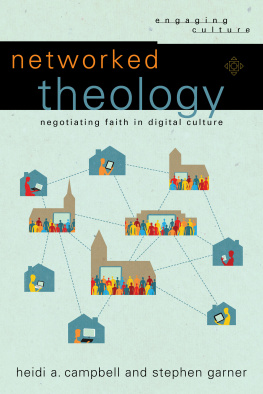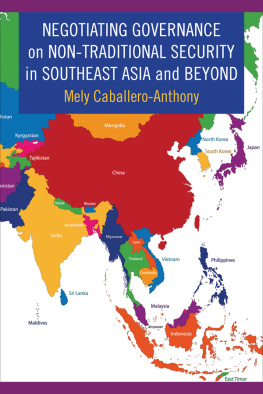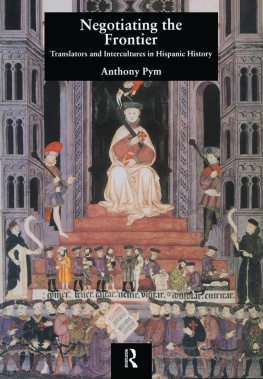Negotiating Digital Citizenship
Negotiating Digital Citizenship
Control, Contest and Culture
Edited by
Anthony McCosker, Sonja Vivienne and Amelia Johns
London New York
Published by Rowman & Littlefield International, Ltd.
Unit A, Whitacre Mews, 26-34 Stannary Street, London SE11 4AB
www.rowmaninternational.com
Rowman & Littlefield International, Ltd. is an affiliate of Rowman & Littlefield
4501 Forbes Boulevard, Suite 200, Lanham, Maryland 20706, USA
With additional offices in Boulder, New York, Toronto (Canada), and Plymouth (UK)
www.rowman.com
Selection and editorial matter Anthony McCosker, Sonja Vivienne and Amelia Johns 2016
Copyright in individual chapters is held by the respective chapter authors.
All rights reserved . No part of this book may be reproduced in any form or by any electronic or mechanical means, including information storage and retrieval systems, without written permission from the publisher, except by a reviewer who may quote passages in a review.
British Library Cataloguing in Publication Data
A catalogue record for this book is available from the British Library
ISBN: HB 978-1-7834-8888-9
PB 978-1-7834-8889-6
Library of Congress Cataloging-in-Publication Data
ISBN 978-1-78348-888-9 (cloth : alk. paper)
ISBN 978-1-78348-889-6 (pbk. : alk. paper)
ISBN 978-1-78348-890-2 (electronic)

The paper used in this publication meets the minimum requirements of American National Standard for Information SciencesPermanence of Paper for Printed Library Materials, ANSI/NISO Z39.48-1992.
Printed in the United States of America
Contents
Sonja Vivienne, Anthony McCosker and Amelia Johns
Anthony McCosker
Amanda Third and Philippa Collin
Gerard Goggin
Deborah Lupton
Eugenia Siapera
Bronwyn Carlson and Ryan Frazer
Andrew Quodling
Sonja Vivienne
Amelia Johns and Abbas Rattani
Sonja Vivienne, Brady Robards and Sian Lincoln
Kath Albury
Pip Shea
Mike de Kreek and Liesbet van Zoonen
| Photo still from the film, Somewhere in America #MIPSTERZ |
| Joslyns digital art and blog post on Stories Beyond Gender |
| Analytical model for the social effects of a local memory website |
| Heuristics of the development of three indicators in the online dynamics |
| Five continuums based on the organisational dimensions |
As with all edited collections, there are many people to thank. We have each benefited from the advice and help of colleagues. At Swinburne University of Technology, we would like to thank Rowan Wilken especially for his generous and wise guidance throughout, as well as Lisa Gye, Esther Milne, Paula Geldens, Aneta Podkalicka, Ellie Rennie and Milovan Savic. Gerard Goggin deserves special thanks for suggesting a collection during a chat about the ideas in Daegu, South Korea. At Deakin University, we would like to also warmly thank Fethi Mansouri and Michele Lobo, for allowing ideas that found their way into this collection to be fostered through generous mentorship and support, as well as Anita Harris, Paula Muraca, Sam Balaton-Chrimes, Victoria Stead, Jessica Walton and Taghreed Jamal Al-Deen, who have offered valuable counsel and feedback. Many authors also have research participants to thank, and these acknowledgements are included with each individual chapter. Thanks to Mark McLelland and Andrew Whelan for accommodating a panel discussion on the core ideas of the book early in its development.
We also wish to express our gratitude to Anna Reeve at Rowman & Littlefield International for supporting the idea in the early stages and Dhara Patel for assisting in the final stages.
Many peer reviewers have contributed to the quality of the chapters, and we thank them for their often unsung contribution. And, of course, thank you to all of the excellent contributors to the collection. Finally, we wish to acknowledge the support of our families and friends. Anthony would like to thank Leila, Lewis and Edith for their patience and encouragement. Sonja would like to thank Gill, Rosie and Ari for ongoing Team support. Amelia would like to thank Lillian and Bob.
Between Control, Contest and Culture
Sonja Vivienne, Anthony McCosker and Amelia Johns
Digital citizenship is a highly contested notion primed for critical scrutiny. With near ubiquitous use of mobile devices and social media platforms, there is an inherent tension between the promise of new modes of civic participation, inclusion and creativity, and the threat of misuse and misappropriation, alongside the risk of harm or harassment. Expectations of young people, educators, social service providers and government authorities are framed around the appropriate use of technology. We are told to strive for safe, productive and civil practices in order to counter online harassment, trolling, bigotry, identity and reputation mismanagement, intrusive personal data collection, surveillance and privacy breaches. Thus, the notion of digital citizenship is invoked negatively to address problems, with less attention to the promises of creative culture and alternative modes of participation.
This book aims to challenge the prevailing normative sense of digital citizenship by exploring digital, mobile and social media affordances that, even in their risks and failings, can point towards innovation, social change and public good. Digital citizenship, we argue, needs reframing through empirical research and critical scholarship so it can better reflect the diverse experiences that constitute a life integrated with digital and networked technologies. Negotiating Digital Citizenship does this work by probing restrictions and opportunities for social action through new forms of control , possibilities for contest and the capacity for creative cultures of practice. Our definition of digital citizenship encompasses these three overlapping elements and is articulated through iterative processes, tested and contested through multiple forms of activism and reconfigured through creative expressions of identity and cultural action. Digital citizenship is not simply a set of rights and responsibilities or appropriate behaviours, but emerges as a fluid interface that connects control mechanisms with people and practices within even the most intimate of cultural contexts. Each of the chapters in this collection corresponds to one or more of these overlapping elements; but each builds and deepens our understanding of what digital citizenship is becoming.
Broadly speaking, understandings of citizenship have revolved around national identity and a list of material and philosophical expectations framed as the rights and responsibilities of a citizen subject. Some scholars lean more to measures of political or economic participation, while others consider distinct rhetorical stances (Young, 1997; 2011) spanning from deliberative (aimed at consensus) to communicative (aimed at mutual understanding). Other scholars such as Dahlgren (2006) argue for cultural citizenship that is inclusive of less formal definitions of civic agency and complexities of meaning, practices, communication and identities (Dahlgren, 2006).
Meanwhile, back in 2007, Mossberger, Tolbert and McNeal defined digital citizens as those who use the internet effectively and every day (Mossberger et al., 2007). Their approach emphasises participation in society through digital infrastructures and the internet. This entails three aspects of online participationinclusion in social discourses through digital literacy, facilitation of democratic participation and equal opportunity in the marketplace. Their focus builds on the dominant US conception of citizenship through civic and economic participation, with the digital as a form of arbiter or mediating adjunct. Similarly, Couldry et al. (2014) consider digitally supported activity but extend the parameters wider to canvas storytelling, narrative, story archiving and commentary. They also call for recognition as a defining trait of digital citizenship, although this is a measure that is complicated by asking, recognised by whom ? This question corresponds with broader citizenship debates, in which citizenship is often regarded as a tool for integrating subjects into the nation state (Marshall, 1977; Schudson, 1999). Under policies for managing cultural diversity, this has involved formal minority recognition whilst maintaining the core values of the hegemonic culture. Critics of this approach have argued that this does not meet the needs of various marginalised groups including, for example, disabled people, diverse gender and sexualities, and migrant, ethnic and cultural minority youth, who have a strong desire for increased agency and social participation beyond the bounded forms of recognition on offer (Noble, 2011; Harris, 2013).

 The paper used in this publication meets the minimum requirements of American National Standard for Information SciencesPermanence of Paper for Printed Library Materials, ANSI/NISO Z39.48-1992.
The paper used in this publication meets the minimum requirements of American National Standard for Information SciencesPermanence of Paper for Printed Library Materials, ANSI/NISO Z39.48-1992.









